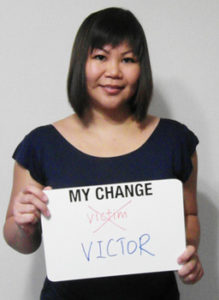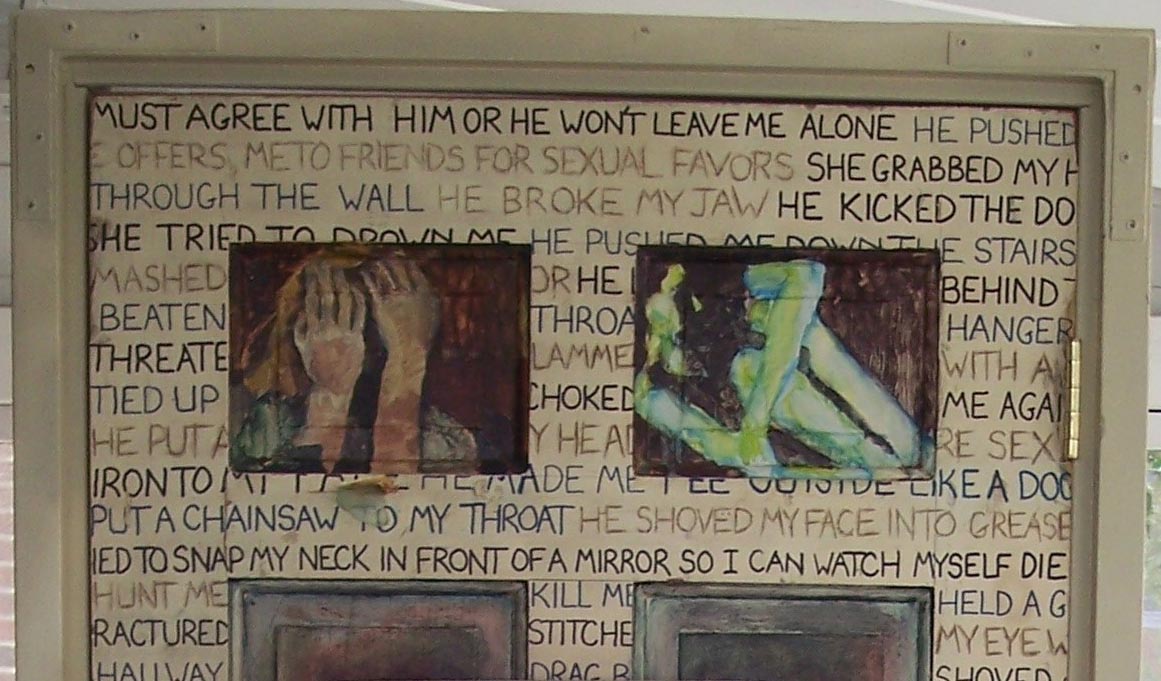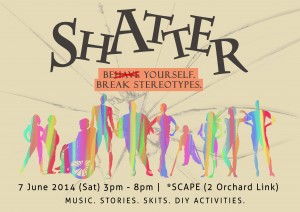A recount of struggles with dating violence and getting through it by Nicole Laurens, Change Maker
You can watch Nicole read her speech here!
Let me start by asking you this – how many dating violence cases have you heard of? A few? There are many more – some just choose to tell only those they ‘trust’. Which sometimes aren’t exactly the people who will help them get out of the current situation. Some are afraid of the consequences of coming out with their story. I was one of them, but I have turned that fear into something positive to encourage people to realize their self-worth as well as know their rights to live as a human being, not under anyone else. I don’t share my story for any other reason, than to make this group of people realize that they are not alone in their battles.
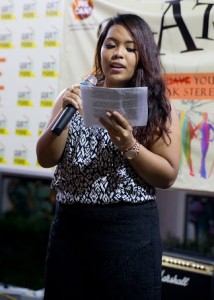 Let me move on to describing what I see as abuse and show you why people take it really lightly. When you think of abuse, you think of… blood? Bruises? Scars? Well dating abuse comes in many forms, mainly physical, emotional and psychological. Violence, in the physical abuse sense, doesn’t just occur on its own. Whatever physical abuse you see or hear about has a much bigger abuse story behind it.
Let me move on to describing what I see as abuse and show you why people take it really lightly. When you think of abuse, you think of… blood? Bruises? Scars? Well dating abuse comes in many forms, mainly physical, emotional and psychological. Violence, in the physical abuse sense, doesn’t just occur on its own. Whatever physical abuse you see or hear about has a much bigger abuse story behind it.
How do these people get into such relationships? Most of the time it starts with low self-esteem, having the habit of giving in and overlooking major flaws instead of rectifying the flaws. Why do they stay? The same reasons, and most commonly, fear. How mine started was with low self esteem. A school jock actually asked me out on a date and I was like, whoa, who me? Nobody was interested in knowing me, not that I was bothered but it was a big thing for me when he asked me out. He used this to his advantage, constantly reminding me later into the relationship that because of him, I was brought up to a higher social status and everyone knew me. Before he came around, I was a nobody. He reminded me of this several times and me, I felt like I owed it to him.
So it starts with these unhealthy thoughts, not respecting yourself and knowing your self worth enough. In other words, not loving yourself. When you start of with these things, you tend to overlook many occasions that disrespect yourself as a human being. I received my first slap a few months into the relationship because I wanted to leave him. Apart from not being allowed to call him by name, to walk away from a heated argument was considering rude instead of mature and not using up all my energy to apologise for something was considered little effort on my part.
So slowly it turned into fights in public areas, during my A level examination period, during work etc. Pulling of hair, pushing, getting screamed at, getting bruises from his really strong grip became norms. I’m not saying I’m an angel, yes, in self defence I learnt that being violent back got us ‘even’. Whenever I cried about getting hit, he’d say, ‘you hit me back the other day’. How did I ever think that was okay? So I got used to it, and I was so afraid to do so many things. Asking for a breakup was a ticket to getting into an emotionally exhausting argument that could last for days and sleepless nights. If he asked for a breakup and I didn’t disagree, I would be accused of being a liar, and getting called many degrading names also became a norm. Fat, ugly, dirty, smelly – if I didn’t date you, you think anyone else would? If you don’t lose weight, don’t be with me. I cried almost everyday until I woke up every single morning planning my day just so I don’t get him angry. If I did something wrong, I had to beg him for forgiveness. This snowballed into something so psychologically abusive that I turned into a completely different person and lost almost all my friends. I graduated with a handful of friends, mostly my classmates. The rest gave up on me, and they asked, ‘Why is she so stupid to stay with him?’ That’s how it snowballed, from a simple mistake on my part – not respecting myself enough. He kept saying, ‘You are the only one who will ever tolerate my attitude and the way I treat you. So when the day comes that I become better, you will be the only one who deserves me at my best.’ Constant forgiveness leads to you waiting for…. Practically nothing.
My colleague lodged a report for me, but my family dropped the charges, why? I wanted a better future for myself and I wanted him to change himself for his future and not ruin it. I wasn’t going to stoop to his level, trying to destroy someone else’s future. I’m better than that.
However, the question asked is such a common question – Why does she stay with someone like that? Or in other cases even, Why is he still with her when she abuses him? I feel that that shouldn’t be the first question on anyone’s mind when they hear about an abuse case. Shouldn’t they be asking instead – Why is he or she abusive? Why does he or she think they have the right to do that? Why does he or she event think that the victim is deserving of all of this? The same concept as when it comes to rape – instead of saying, Don’t get raped, people should be saying, Don’t rape. The antagonist in the situation shouldn’t be made to think that he or she has the right to continue doing what they want as they like.
For me, I knew that I had stop being afraid of all the threats and blackmails he dared to impose on me. I took the risk finally, left, and suffered consequences you cannot imagine. Threats given were carried out, my worst fears. He always said, ‘if you hurt me once, I’ll give you back ten fold’ and guess what, he meant it. I was distraught and my parents were disappointed because he got them involved. I couldn’t leave my house without being afraid that he might pop up somewhere unexpected and give chase. Which happened, of course. I spent my days running, not being able to live my life in peace. I hurt my parents so badly, the people who truly loved me, because of someone who had no clue what love was. Losing friends was hard but losing my parents, even for a week, was unimaginable.
Let me be honest, I was at my lowest – at my weakest. I took pills, a lot of them. I tried pills with alcohol. I took cough syrup. Which I realized, after talking to some people, was something a lot of people were actually taking to forget their problems. Yes I had complications with my body but none enough to end everything. So what I did was write a list of things I would miss, and the list of people who might miss me. Since I had nobody, I tried to get up myself and start talking to friends I lost. I’m glad to say, I got some of them back. It wasn’t easy, definitely. But I did it. I got these friends to support me. It wasn’t easy getting friends who genuinely wanted to help. Some people are just there to judge you, trust me. I’ve met too many of them. All they want to do is get into your life, know your story, then talk about it to their friends. Biggest mistake.
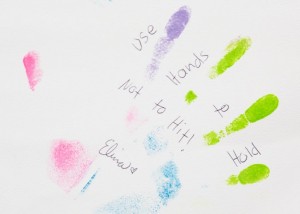 I will not let my experience sink into me and affect what I have ahead of me but I will definitely put it into good, positive use. Since my downfall and my struggle to get back up, I have joined AWARE as a Change Maker, mainly because I want to raise awareness of dating violence and abuse as a whole. I plan to attend more workshops and hopefully eventually come up with my own because it irks me that people are in such situations, thinking they have insufficient support or that they’re too weak to step out of it.
I will not let my experience sink into me and affect what I have ahead of me but I will definitely put it into good, positive use. Since my downfall and my struggle to get back up, I have joined AWARE as a Change Maker, mainly because I want to raise awareness of dating violence and abuse as a whole. I plan to attend more workshops and hopefully eventually come up with my own because it irks me that people are in such situations, thinking they have insufficient support or that they’re too weak to step out of it.
To sum up, I lived a little over three years of my life believing that this was the only way to be strong – to hold on and not give up. To accept that there was no other way to save my life. Since I broke free from this prison, I had a few girls come to me telling me their issues. And these girls – they have no idea how to step out of it. I’m pretty sure there are a lot of girls and guys going through this. We think it’s love but love is not about possession or getting your way. Efforts do not mean you have to chase your partner for hours just to show it, or leave them 60 missed calls to prove you’re apologetic.
And you need to realize this.
Abuse, is not about blood, bruises and cuts only. Dating abuse is about how your life is affected by a relationship. Mine was extremely unhealthy but there are a lot of unhealthy relationships out there, no matter how mild you think it is. Step out of it. I allowed myself to let mine snowball into the unthinkable. It was very hard for me to recover. I had nightmares every single week due to my anxiety. When I tried moving on, I had the biggest fears that chased people I just met away.
Find people to speak to. Professionals, or people with experience who will provide that strength for you. You are NOT alone. Find help because some of us are more vulnerable than others. Fear is temporary. The loss of self-respect is extremely detrimental – I learnt that the hard way. There will be people who understand you, but of course you need to know who exactly. No matter what, life goes on. Love yourself before anyone else because when all else fails, only you are gonna there for you.
If you know of anybody going through any form of abusive relationship, please know that whatever you see happening, is only a tenth of what the victim goes through.
Of late, I have been providing support for a few girls who have come to talk to me since I reached out with my story. Inspired by the event where I was being abused in school and not a single person came to stop it, I am also currently working on a dating abuse awareness campaign to hold in my university, hopefully early 2015.
Thank you.















